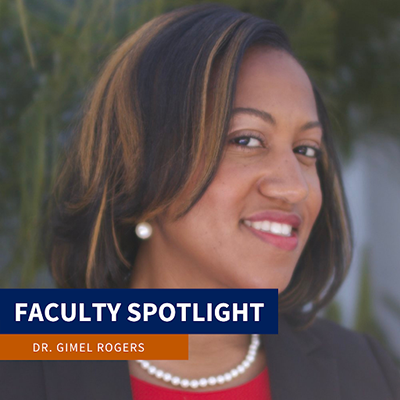Faculty Spotlight: Dr. Gimel Rogers
 Dr. Gimel Rogers, PsyD ABPP is Faculty and Associate Director of the Online MACLP
Program, licensed psychologist, ordained deacon, pastor, and consultant. She is a
curriculum specialist, trainer, and facilitator of programs that address implicit
and explicit bias, individual and community trauma in both small and large organizational
systems.
Dr. Gimel Rogers, PsyD ABPP is Faculty and Associate Director of the Online MACLP
Program, licensed psychologist, ordained deacon, pastor, and consultant. She is a
curriculum specialist, trainer, and facilitator of programs that address implicit
and explicit bias, individual and community trauma in both small and large organizational
systems.
Gimel Rogers, Psy.D., ABPP is a licensed psychologist and is Board Certified in Clinical Psychology from the American Board of Professional Psychology. With over 10 years of clinical, professional speaking, and training experience she is the owner of F.I.R.E. Igniting Lives and founder of One Temple Fitness. She earned her doctorate from Pepperdine University and has provided trauma-focused care with clients from the Children of the Night Program, the Ventura Youth Correctional Facility, FCI Terminal Island, and community programs serving survivors of intimate partner violence. She is an expert witness and assists clients who are involved in criminal, family, and civil cases involving a broad range of forensic issues.
Therapeutically, Dr. Rogers presently works with survivors who are recovering from emotional, physical, and sexual abuse as well as persons coping with life’s stressors. She utilizes an array of therapeutic interventions with an emphasis on cognitive-behavioral therapy. She has published in the areas of culture, coping, spirituality, and trauma. Her inaugural book is the “21-Day Relationship Healing Devotional and Journal” a poetry-based devotional that promotes restoration through reflection. She is the content developer of the Power and Control Wheel of Historical Trauma.
Areas of Expertise:
The following areas are some specialty domains for training and presentations: complex trauma, cultural sensitivity, and implicit bias, intimate partner violence (i.e., domestic violence), the impact of systems on youth, effects of trauma on the brain, sexual misconduct in various settings (e.g., church, corporate, community-based organization, etc.), trauma-informed practices, working with juveniles, trauma’s impact on religion and spirituality, and strengthening working relationships.
Her advice for students during this time is to focus on taking care of oneself, as we are not able to fully help others until we have spent time helping ourselves. She encourages students to take time to feed your mind, body, and spirit, and increase your self-care techniques. To support her mental health, Dr. Rogers loves to cook, exercise, and spend time with loved ones.
To learn more about Dr. Roger’s work, please see her website.